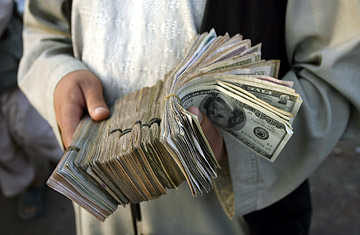
A money changer in Kabul displays his offerings.
Afghanistan will top the agenda when NATO member nations gather this week in Bucharest to discuss the state of the alliance. General Dan McNeil, commander of the alliance's 43,250 troops in Afghanistan, has lobbied for reinforcements to help battle the rising insurgency in the country's south. But commanders on the ground would also like a little more help from the Afghans on whose behalf they're fighting. "Frankly, defeating the Taliban is the least of our worries," says one. "They are not going to beat us. It's not them that are crippling the economy. What is killing this country is corruption and drugs. That is not for NATO to deal with; that is for the Afghan government to deal with." Military measures are temporary, at best: If Afghans don't trust their government, NATO's best efforts will ultimately be futile.
Transparency International ranked Afghanistan 172nd out of the 179 countries surveyed last year on its corruption-perceptions Index. Hardly surprising, then, that despite thousands more troops on the ground and billions of dollars in aid, the Taliban insurgency has only grown stronger. Ordinary Afghan people are fed up with a government that has squandered their faith and hope by pillaging whatever small treasures remain after 27 years at war. Yet they also resent the international forces that put that government in power but look away when it doesn't fulfill its duties. And the distance between the people and the government in Afghanistan is ever widening, creating fertile ground for the insurgency to take root even amongst those who welcomed the new government when it first came to power.
"Corruption is the tree. Terrorism, destabilization, smuggling and poppy are its branches," says parliamentarian Hossein Balkhi. "If you cut down corruption, the rest will die."
Every Afghan has a story about corruption. The electronics store owner in my old neighborhood in the capital, Kabul, hasn't had electricity for the past year, because he refuses to pay the $400 bribe required to secure a connection to the electrical grid. The scarcity of so many basic necessities allows petty corruption to flourish in many corners of the world without necessarily feeding an insurgency. But Afghanistan's corruption is intimately linked to a culture of violence. The driver of an Afghan friend was picked up one day by the police, beaten, stripped naked and left outside in the snow for several nights until his employer paid a bribe of $3,000 to release him. The principled stance would have been to complain, but to whom? And for how many days? And what if it only made things worse? "We could have complained afterwards," says the employer. "But then we could have been charged ourselves for bribery." The electronics shop owner, Adel Shah, 22, puts it succinctly: "Even robbery victims won't go to the courts because you have to pay a bribe. You would have to quit your job in order to complain to the police, because it takes so much time."
And also money. According to Afghans, judges routinely accept bribes for favorable verdicts. Mohammad Mumtaz, an Afghan businessman visiting from the U.S., tells the story of a cousin's property dispute gone bad. His opponent paid a higher bribe to the court, and his cousin landed in jail for trying to get a squatter off his land. But it turned out OK, says Mumtaz. The cousin went through a broker who was a friend of the judge, paid $6500, and was released a month early. Such stories take on a more somber note when criminals and alleged members of the Taliban are involved — such as Timur Shah, sentenced to death for kidnap, rape and murder, who "escaped" on the eve of his execution last October, while the other 16 men on death row met their intended fate.
"What do you expect," asks Izzatullah Wasifi, Director of the General Independent Administration of Anti- Corruption and Bribery, "when we pay a [policeman] $60 a month, give him a gun, and tell him to stand up against terrorists and narcotics smugglers, when everyone around him is corrupt? We pay him nothing and expect him to act like an angel and go home and feed his family what — dust, rocks?" The solution, he says, is better training and higher salaries, both of which are forthcoming under a new U.S.-led national police-training program. But as long as higher government officials act with impunity, corruption will not be seen as a crime. "You have to start from the top," says Wasifi. "If I don't take it, then my department won't take it. If I take it, how can I expect people below me not to?"
Last fall, President Hamid Karzai admitted that several senior officials were involved in corruption. Though he didn't reveal any names, he swore to take action. Five months later, not a single official has been successfully prosecuted. Meanwhile, politicians and ministers build mansions and collect armored SUVs worth far more than their yearly salaries. "If we can't punish them, how do we tell a small government official who makes $40 a month not to take bribes?" asks Wasifi.
Wasifi understands the value of punishment. Twenty years ago he served time in an American jail for dealing drugs. "I paid for it. I learned. This is why I believe in good law. It works."
The Taliban, for all its draconian practices and human rights abuses, is also remembered for bringing order following the excesses of rival commanders in the country's civil war. Crime was punished — brutally and in excess, yes, but visibly and uniformly. If the Taliban and the insurgents can convincingly offer civilians a return to law and order, they will gain support. The Afghan government may realize that it's better to take a page from their book — tempered with human rights and due process — than to be defeated by an inability to crush corruption.
